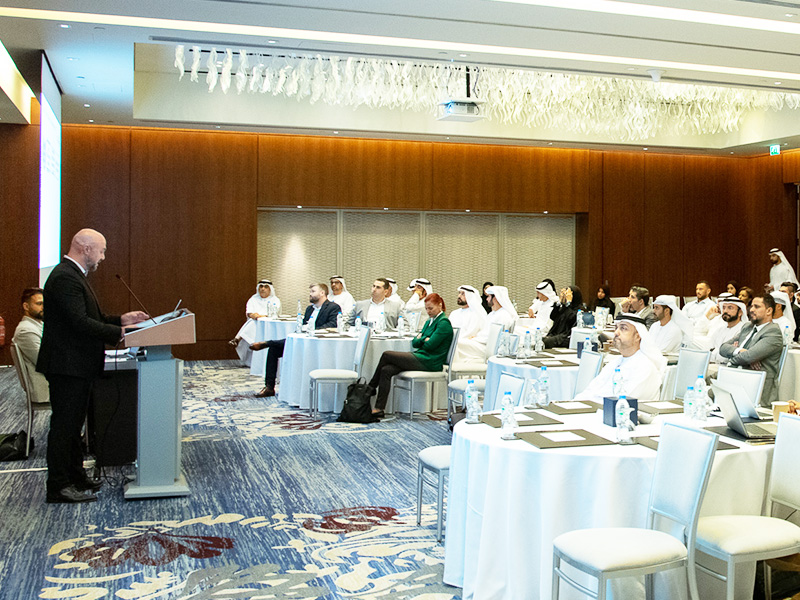
The Department of Energy (DOE) held its first workshop in a series of workshops planned for this year on Energy Efficiency Policy, with the active participation of more than 70 attendees representing 42 Government owned entities and companies in the Emirate of Abu Dhabi.
The workshop aimed to enhance overall participation and to support the implementation of the guiding principles of the Energy Efficiency Policy in Government buildings and facilities, which is one of the initiatives that the Department of Energy is leading to support achieving the Abu Dhabi Demand Side Management (DSM) and Energy Rationalization strategy 2030 targets, striving to achieve savings of 32% of water and 22% of electricity by 2030, through implementing a number of programs in collaboration with sector stakeholders.
The workshop included an overview of the Energy Efficiency Policy and the steps for its implementation, showcasing best practices in reducing consumption in buildings and facilities through the implementation of energy and water efficiency measures and promoting awareness and a culture of sustainability. Participants also exchanged experiences and explored ways of cooperation with various stakeholders, experts, and energy service companies.
His Excellency Eng. Ahmed Mohammed Al Rumaithi, Undersecretary, Abu Dhabi Department of Energy, said: “During the Year of Sustainability 2023, we continue to further our stance on energy efficiency, resources conservation, and CO2 emissions reduction in line with our commitment to achieving the UAE Net Zero 2050 and Abu Dhabi Vision 2030.”
His Excellency added: "Holding such workshops will provide government entities and companies with tools and knowledge to better manage their buildings and facilities to minimize their carbon footprint and help reduce costs and operational expenses resulting from energy consumption. It will also enable us to establish a culture of energy and water efficiency and promote the lead by example principles in government owned entities and companies in Abu Dhabi."
The DoE workshops align with the UAE Net-Zero by 2050 commitment to achieve net-zero emissions by 2050, making the country among the first in the region to strive towards this ambitious target. This is in addition to the significant economic opportunities resulting from the carbon neutrality journey, directly supporting the UAE's development vision as one of the most resilient and vibrant economies in the world.
Eng. Ahmed Al Falasi – Energy Efficiency Sector Executive Director / Acting, affirmed: “The workshops are in accordance with the approved Demand Side Management Strategy and they aim to establish an implementation framework to assist government entities in rationalising their water and electricity consumption and adopting effective conservation measures in their premises and facilities.” Also adding that these workshops come in line with the DoE role as a policy maker and regulator responsible for issuing sector policies, strategies and regulations and ensuring their implementation and compliance.
Al Falasi added: “We have provided participants with the tools to create internal policies, plans and initiatives, raise awareness, and improve methods used in energy and water efficiency.”
Eng. Wael Ezzeldin, Energy Efficiency Policies Section Head / Acting, said: “Our workshops will drive home the importance of the DoE’s Energy Efficiency Policy as an enabler to the building retrofitting and behaviour change programmes. They will help participants develop work-plans, set targets, and implement energy and water efficiency measures within their offices and facilities. They will be able to assess energy and water efficiency performance through 7 steps, starting with issuing internal policies and assigning energy champions responsible for collecting and analysing data, establishing baselines and benchmarks setting goals, conducting technical assessments, and carrying out audits. Furthermore, they will be able to create action plans by defining technical measures and targets for each building, and determine roles and recourses required.”
It is worth mentioning that the Abu Dhabi Emirate's Demand Side Management and Energy Rationalization Strategy 2030, which was launched in 2019, has achieved good results so far, via the ongoing implementation of programs that have contributed to saving 6,183 gigawatt-hours of electricity during 2019-2020, equivalent to reducing emissions of approximately 3.2 million tons of carbon dioxide.
